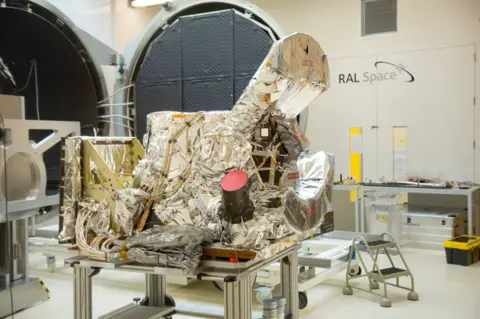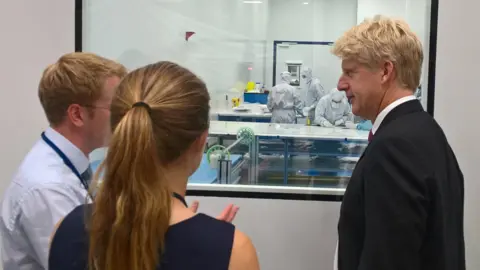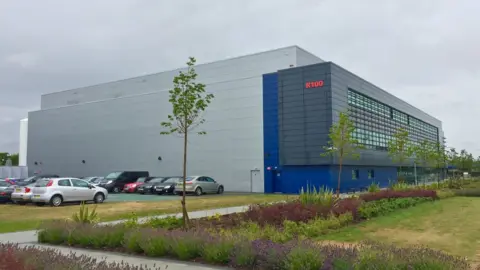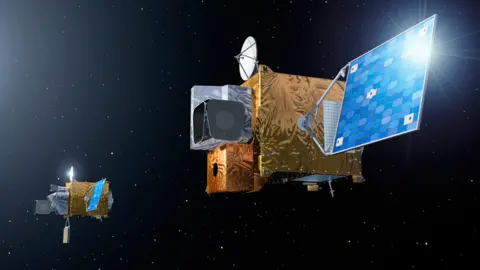Big cash boost for UK satellite sector
 RAL SPACE
RAL SPACEThe UK government formally announced a more-than-£100m investment in the space sector on Tuesday.
It is putting £99m into the Harwell science campus near Oxford to extend its satellite test facilities.
A further £4m is going to Wescott in Buckinghamshire where rocket motors are built and tested.
"It's a fast growing sector - 8-10% per year; and it's clearly important that the UK maintains a strong position," said science minister Jo Johnson.
"It's government's role to create the environment in which we can stay at the cutting edge of developments. All the market analysis suggests there are going to be many thousands of satellites launched into space between now and 2025, and we've got a good prospect here in the UK of being right at the very heart of it all."
 STFC
STFCHarwell, which has become a major hub for space activity, has long built and tested the instruments that go on satellites.
The campus has recently upgraded its offering in what it currently calls its R100 building, but the new money from government will see this complex broadly double its footprint.
The finished structure, due to open in 2020, will also take on the name of the National Satellite Testing Facility (NSTF).
"This is going to help particularly those companies just coming into the space business," said Dr Tim Bestwick from the Science and Technology Facilities Council, which co-ordinates the Harwell hub. "These new companies will be able to use this shared national infrastructure; they know they don't have to build it themselves."

R100 services are already in strong demand, even though some have yet to be fully installed. Two 5m-by-6m thermal-vacuum chambers are going in that have been booked for use several years ahead.
"You put something in these chambers to test for quality: you heat it, you cool it and you put it in a vacuum - just to make sure it all works," explained Dr Chris Mutlow, the director of RAL Space, who operate the current R100 space test facility and will manage and run the new NSTF. "But then we do the extra step of radiometric testing where you put a calibrated source in front of an instrument to be sure it gets the right answers.
"That's very important, for example, for the inter-comparison of sensors used in climate monitoring where you need very long records."
Some of these sensors will fly years apart, but the calibration ensures their data are fully comparable.
Another chamber is coming that will be 8m tall. It will have the volume to be able to hold the very biggest telecommunications satellites for testing. These spacecraft can be over six tonnes in weight.
 ESA
ESATo date, it has been common for many British satellite companies to send some of their equipment abroad, to continental Europe, for final testing. That is partly to do with access to the right expertise but it can sometimes simply be a matter of no available facility in the UK at the right time.
Dr Graham Turnock, the UK Space Agency's CEO, hopes the NSTF will see much more work retained on home soil. "It's soup to nuts, isn't it? You should be able to set up and run a space business in the UK and be able to go from conception to launch. And if we can offer that, it's going to make the UK a tremendously attractive place to do space."
The additional £4m investment is going into a National Space Propulsion Facility at Wescott Venture Park. Wescott is famous for being the home to rocket development in the post-war era.
Reaction Engines, a company based very close to Harwell, recently announced it would build a test-stand at Wescott. Reaction Engines has a very promising design for an air-breathing rocket system that could power a spaceplane or a rapid intercontinental airliner.
Any discussion of the space sector these days quickly turns to Brexit.
The UK is heavily involved in pan-European projects, some of which are funded through the European Union. These include the Galileo satellite-navigation system and the Copernicus-Sentinel constellation of Earth observation satellites. Future Sentinel instrumentation is already scheduled to come to Harwell for testing.
The government has stated in its Brexit White Paper that it would like to continue to collaborate on such programmes.
"UK companies have made a massive contribution; they are successful programmes," said Mr Johnson. "We want UK companies to continue to participate in these programmes but obviously this is going to form part of the broader discussion around the terms of our exit from the European Union," he told BBC News.
[email protected] and follow me on Twitter: @BBCAmos
